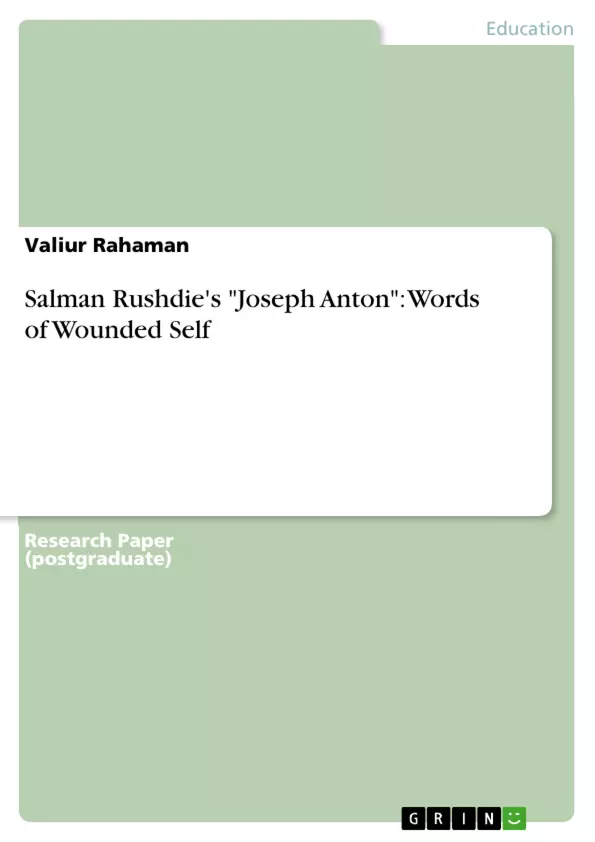As a memoirist Salman Rushdie expressed about his moralizer or demoralizer; supporter or condemner. He speaks and writes about all who played important role in making Ahamad Salman Rushdie a ‘Satan Rushdie’. He exposed realities of reactions against him, seen and heard, ‘Hang Satan Rushdy’. His opponents thought and sought him a rebel, condemned him by calling a recalcitrant. Salman Rushdie made us realize that he never liked when he was called ‘Joe’, a pseudonym used by well-wishers and officials during fatwa -years. But, in all circumstances he maintained his literary and art taste which finally result a coinage of his name, ‘Joseph Anton.’
In this research paper, we shall find Rushdian revaluation of the self, sex, and the power of an author.
Inhaltsverzeichnis (Table of Contents)
- Salman Rushdie's Joseph Anton: Words of Wounded Self
- The Rebel Tone and the Eligibility to Deny
- The Memoir as a Form of Self-Expression
- The Epigraph and the Theme of Destiny
- Joseph Anton: A Second Birth-Name
- From Fatwa to Terrorism: A 13-Year Chronicle
- The Etmology of Memoir: Memory and Reminiscence
- The Writer's Self and the Singularities of Memory
- Memoir and Autobiography: A Spectrum of Self-Narratives
- Rousseau's Confessions and the Self-Celebration of Freedom
- The Threatened Self: Afterwards
Zielsetzung und Themenschwerpunkte (Objectives and Key Themes)
This essay explores the memoir *Joseph Anton* by Salman Rushdie, analyzing his experiences during and after the fatwa issued against him in 1989. The essay examines the themes of self-expression, freedom of speech, the role of the artist in society, and the impact of cultural and political conflict on the individual.- The significance of denial and freedom of expression in artistic creation.
- The role of memory and reminiscence in shaping personal identity.
- The impact of cultural and political conflict on individual lives.
- The multifaceted nature of self-identity and the tension between individual and societal expectations.
- The relationship between art and reality, and the potential for art to shape our understanding of the world.
Zusammenfassung der Kapitel (Chapter Summaries)
- The essay begins by introducing the central theme of the memoir: Rushdie's assertion that “Everything even holy writ, could be investigated and, just possibly improved.” This statement reflects the rebellious tone of the memoir and highlights the significance of freedom of expression in artistic creation.
- The second section focuses on the memoir as a form of self-expression, exploring how Rushdie uses his writing to express his experiences and opinions. This section also discusses the reactions of his supporters and opponents, and the impact of the fatwa on his life.
- The third section examines the epigraph to Joseph Anton, which draws from Shakespeare's *The Tempest*. This epigraph establishes the theme of destiny and how the past influences the future. The section also explores how Rushdie uses the idea of destiny to explain his experiences after the fatwa.
- The fourth section focuses on the title *Joseph Anton* and its significance. It is discussed as a second birth-name, born from the condemnation he faced during the fatwa years.
- The fifth section discusses the memoir as a chronicle of Rushdie's life, highlighting the 13 years covered in the book, particularly focusing on his experiences during and after the fatwa. This section also explores the role of writing, narrative, and action in the memoir.
- The sixth section delves into the etymological meaning of memoir, focusing on the role of memory and reminiscence. The section examines how Rushdie uses memory and scraps of recollection to create a coherent narrative of his life.
- The seventh section explores the relationship between memory and writing, exploring how memory shapes the writing of the memoir. This section draws from the works of Augustine and Gore Vidal to illustrate the differences between memoir and autobiography.
- The eighth section focuses on Rousseau's *Confessions*, exploring how Rousseau uses his writing to celebrate his freedom and individuality. This section contrasts Rousseau's experiences with Rushdie's experiences, highlighting the different contexts in which they both write about the self.
- The ninth section concludes with a discussion of Rushdie's experiences "afterwards", specifically focusing on the impact of the fatwa and the threats he faced. This section also explores the role of language and the power of names in shaping identity.
Schlüsselwörter (Keywords)
This essay analyzes the central themes of Salman Rushdie's *Joseph Anton*, including freedom of expression, the artist's role in society, cultural and political conflict, memory, and identity. Key concepts explored include the significance of denial and rebellion in artistic creation, the relationship between memory and writing, the multifaceted nature of self-identity, and the impact of societal and cultural influences on the individual.Frequently Asked Questions
What is the significance of the title 'Joseph Anton'?
It was the pseudonym Salman Rushdie used during his years in hiding, combining the first names of authors Joseph Conrad and Anton Chekhov.
How does Rushdie describe his life under the fatwa?
He chronicles a 13-year period of threats, police protection, and the struggle to maintain his identity as a writer and a free individual.
What is the difference between a memoir and an autobiography?
A memoir often focuses on specific themes or periods of a life based on memory and reminiscence, whereas an autobiography is usually a chronological account of a whole life.
Why does Rushdie emphasize freedom of expression?
Rushdie argues that everything, including holy texts, should be open to investigation and critique, which is central to artistic and intellectual freedom.
How did the fatwa impact Rushdie's literary work?
Despite the danger, he maintained his commitment to art, eventually using his experiences to create the memoir as a form of self-expression and reclamation.
- Citar trabajo
- Dr Valiur Rahaman (Autor), 2013, Salman Rushdie's "Joseph Anton": Words of Wounded Self, Múnich, GRIN Verlag, https://www.grin.com/document/207582



